|
|
|
Sort Order |
|
|
|
Items / Page
|
|
|
|
|
|
|
| Srl | Item |
| 1 |
ID:
167511
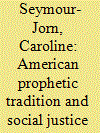

|
|
|
|
|
| Summary/Abstract |
This article responds to recent research calling for more nuanced discussions of Muslim political and social activist subjectivities (Ahmed 2011; Maira 2016; Mansouri et al. 2016; Nagel and Staeheli 2011). We analyze community and social justice activism among Muslims in Milwaukee through the lens of the American prophetic tradition. We argue that Muslim leaders in Milwaukee represent their activism as part of this tradition, and that they draw upon a complex of religious, social and political discourses and social practices. These include American civil rights activism, Islamically inspired social action, and a desire to engage in placemaking that responds to the specific conditions of Milwaukee, a city that features intense racial segregation, dense pockets of poverty, and increased immigration from the Arabo-Islamic world. Thus, we see a pluralization of Muslim social activist subjectivity: social justice activism which is religiously based, related to the civil rights tradition, and which is also highly attuned to the specific ways in which Muslims may practice a politics of belonging in this Midwestern city.
|
|
|
|
|
|
|
|
|
|
|
|
|
|
|
|
| 2 |
ID:
141479


|
|
|
|
|
| Summary/Abstract |
In contrast to similar organizations in its neighbouring countries, Niger's domestic Salafi associations have remained peaceful and apolitical. Drawing on historical institutionalist scholarship and on recent conceptualizations of the state as a religious actor, this article examines how the Nigerien state has tried to regulate religious practices since Seyni Kountché's military coup in 1974. It argues that the institutional regulation of religious practices is one important variable that accounts for Niger's deviant trajectory. During Niger's autocratic period (1974–91), the government established the Association islamique du Niger (AIN) as the sole legal authority regulating access to Niger's Friday prayer mosques. Committed to peaceful and apolitical interpretations of the Koran, the AIN confined access to Niger's religious sphere to local clerics and Sufi brotherhoods. After the breakdown of autocratic rule in 1991, the AIN served as a religious advisory body. Salafi associations could assemble freely but had to abide by certain criteria. Confronted with the prospect of Islamic violence in 2000, the Nigerien state intervened in Niger's religious sphere in several ways. Among other initiatives, the government began to resurrect a more rigorous system of religious supervision in order to monitor religious practices on an ongoing basis.
|
|
|
|
|
|
|
|
|
|
|
|
|
|
|
|
| 3 |
ID:
120761
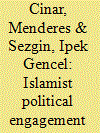

|
|
|
|
|
| Publication |
2013.
|
| Summary/Abstract |
This study examines what has been overlooked by most studies of Islamist activism in the early years of the multi-party politics (1945-60) in Turkey. By examining the formal and informal political institutions, power relations and practices, it reveals that the early Islamists did not remain content with only socio-cultural activities. They effectively and creatively engaged with and within the political field, enjoyed an impact disproportionate to their actual numbers and power, and set the parameters for future Islamist activism. In so doing, they reproduced the Republican orthodoxy while advancing their heterodox claims.
|
|
|
|
|
|
|
|
|
|
|
|
|
|
|
|
| 4 |
ID:
091827
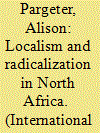

|
|
|
|
|
| Publication |
2009.
|
| Summary/Abstract |
Over the past three decades North Africa has experienced a wave of Islamic activism. From the emergence of groups such as Shabiba Islamiya in Morocco in the 1970s to the recent appearance of Al-Qaeda in the Islamic Maghreb, the region has been home to a plethora of different Islamist movements, each with its own national characteristics. As such the region has displayed a general propensity to Islamist activism. However, certain areas within each North African state have proven particularly receptive to the ideology of political Islam. Although this trend is by no means universal, given the strong appeal of the Islamist ideology that has been able to transcend geographical boundaries, these areas have nonetheless been a key source of recruitment not only for the more moderate strands of the Islamist opposition, but also to the militant movements and networks that espouse violence. As such there would appear to be a correlation between localism and Islamist activism in North Africa. Focusing on Morocco, Tunisia and Libya, this article will examine some of these local issues and will argue that in order to understand better the causes of radicalization in the region, the rise of Islamism in North Africa should be considered within the broader historical context of political and cultural resistance by certain peripheral regional elements to a dele-gitimized and stagnated central authority.
|
|
|
|
|
|
|
|
|
|
|
|
|
|
|
|
| 5 |
ID:
097802
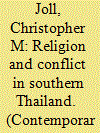

|
|
|
| 6 |
ID:
158202
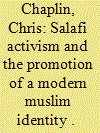

|
|
|
|
|
| Summary/Abstract |
Indonesia has witnessed the emergence of a market of Islamic goods, services and media platforms that have catalysed a qualitative shift in the ways individuals come to express their religious convictions. Salafi Islam is no exception to this transformation, and this article provides a case study of contemporary Salafi propagation amongst Yogyakarta’s students and graduates. Through description and analysis of campus based religious lectures, websites, magazines and fashion outlets linked to the al-Atsary Islamic Education Foundation, this article explores the intricacies of campus affiliated da’wa. Linked to a ‘literalist’ interpretation of Islam reliant on scholars in Saudi Arabia, Salafism is frequently denounced as foreign to Indonesian norms. Yet, while activists do indeed promote a rigid adherence to Islamic tenets, they also align Islamic values to concerns with a modern Muslim identity. By framing Salafism as sensitive to ideas of professional employment, while juxtaposing it against images of a less well-educated rural Islam, they have thus have created a unique strand of urban Salafi propagation.
|
|
|
|
|
|
|
|
|
|
|
|
|
|
|
|
|
|
|
|
|